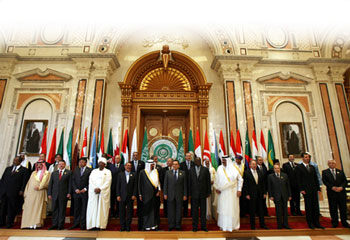
.(FinalCall.com) – There was much anticipation surrounding the 19th Arab League Summit which took place in Riyadh, Saudi Arabia, Mar. 28-29, well attended by kings and heads of state from throughout the world. The evidence of the interest in the meeting was noted by a writer for the Washington Institute for Near East Policy on Mar. 27, stating: “Despite a record of disunity and inconclusiveness, this annual meeting of Arab leaders remains the subject of intense interest in the region.”
Saudi Arabia’s King Abdullah bin-Abdul Aziz al-Saud left no doubt that there was something new in the air, when he opened the summit with a stinging rebuff of U.S. President George W. Bush, when he characterized the war in Iraq as an “illegitimate foreign occupation of Iraq.” He also said that the Arab states would not allow forces from outside of the region to decide the future of the region.
An analysis of the King’s speech published on Forbes.com by Oxford Analytica on Apr. 3, stated the speech was also a “blistering critique of his fellow leaders.” The article mentioned the King’s wide range of subject matter–from Iraq to the Sudan; Somalia and of course Palestine. “He argued that the persistent absence of unity, self-confidence and credibility, among Arab leaders was the cause of extensive foreign intervention in the Middle East conflicts,” the article stated.
“The King talked frankly about the way things were, speaking not as a traditional or even revolutionary Arab leader,” writes Turki al-Hamad, a Saudi Arabian political analyst/journalist writing for Asharq Alawsat newspaper. “He spoke out of the conscience of the average Arab citizen,” Mr. al-Hamad added.
“The Summit, for the first time in its history, adopted a type of discourse that touched the average citizen and avoided the dreams that never bore fruit,” writes Mr. al-Hamad.
Dr. Abdulaziz Al-Maqaleh, a Yemen poet and director of the Yemeni Center for Studies writes: “Every Arab citizen hoped various questions would top the Riyadh summit’s agenda in order to restore some misled minds to the right path and make every Arab ruler believe that relying on his people is the only way to deliverance.” (yementimes.com)
Other analysts say the King’s criticism reflected a belief that the U.S. administration strategy in Iraq is doomed.
The Summit also became the sounding board for the “Arab Peace Initiative” originally adopted by the Arab League in 2002. The resolution calls for the revival of a five-year-old Saudi peace plan that offers Israel normal relations if it withdraws from territories captured in 1967; a just and agreed solution to the refugee issue based on UN General Assembly Resolution 194; and the creation of a Palestinian state with its capital in East Jerusalem.
Arab League members discussed the forming of committees to explain its initiatives to all parties involved in the Arab-Israeli peace effort, according to documents from the meeting published on the Internet.
Mr. al-Hamad calls the Riyadh summit “the birth certificate of realistic Arab politics.” He said the discourse at the summit was about modifying curricula to ensure the promotion of the values of tolerance and creativity, human rights and activating the role of women in the community. “That is a new discourse for Arab League summits,” he said.
It seems from an article on Apr. 2, by the Syrian Arab News Agency (SANA) that there are positive feelings in the Arab world after the summit. The Central Leadership of the National Progressive Front hailed the “fruitful and positive outcome of the Arab summit of Riyadh which constitutes a turning point in boosting the Arab solidarity in the face of current challenges,” according to the SANA story.
Another sign of the Arab desire for unity in the region was demonstrated by inviting “new-Arab Islamic states” to the summit. Iran’s Min. of Foreign Affairs Manoucheher Mottaki told ArabicNews.com on Apr. 2, that he was “satisfied with the initiative of the Arab League and Saudi Arabia in inviting all Islamic states to the summit,” and said, this will bolster and expand cooperation with Islamic nations.
Arab League members approved the Kuwati-Egyptian proposal to hold an economic summit on an annual basis. Observers say this constitutes a step on the path to inter-Arab economic and commercial cooperation, according to the Kuwait News Agency (KUNA).
The KUNA story talks about “fresh studies” of the overall Arab gross production: “In 2005, more than one trillion U.S. dollars (USD); volume of trade jumped from USD 400 billion to USD 870 billion; volume of inter-Arab trade, in 2005 rose to USD 36 billion. Arab states export 22 million barrels of oil per day. Value of the oil exports, in 2005, stood at USD 350 billion.”
The article further stated that “current complex economic conditions, prevailing in Arab states, warrant agreements intended to improve the social and political conditions; and establishing an Arab economic bloc, capable of competing with other coalitions.”












